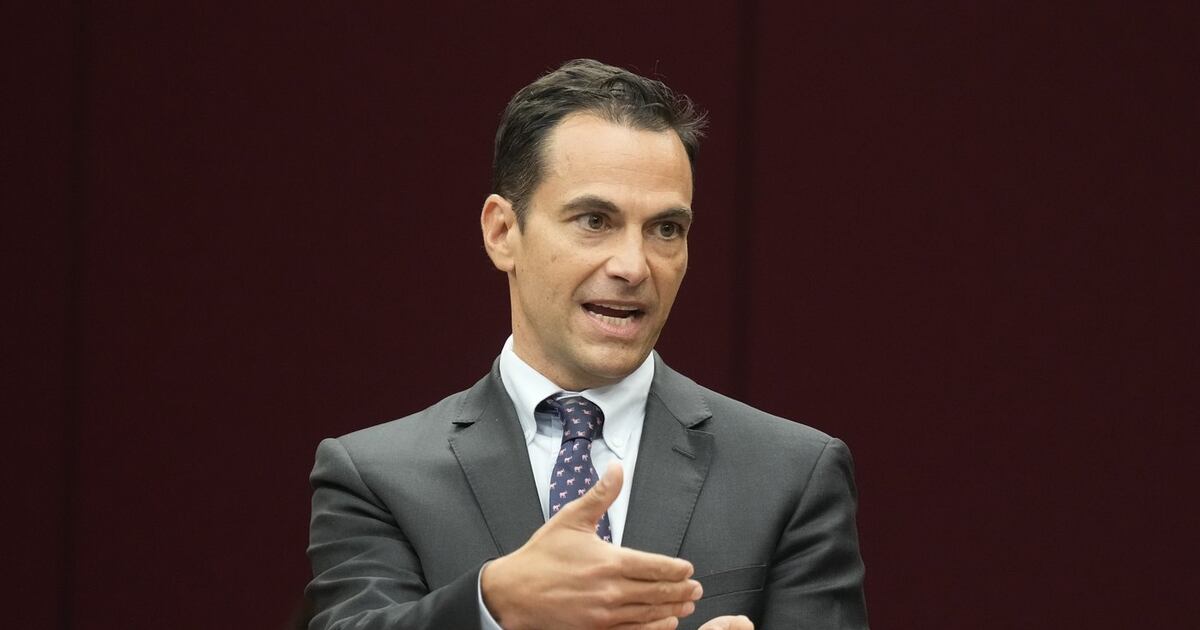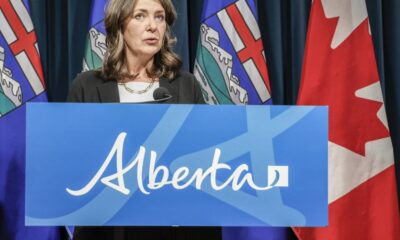Top Stories
Interim PBO Jason Jacques Announces Bid for Permanent Role

UPDATE: Interim Parliamentary Budget Officer Jason Jacques has officially announced his intention to apply for the permanent position following the recent job posting. During an interview on CTV Question Period airing Sunday, Jacques stated, “Oh absolutely,” emphasizing the importance of parliamentarians having a choice in leadership.
This announcement comes as Canada faces urgent fiscal challenges, with Jacques warning that the country is on an “unsustainable” financial path ahead of the federal budget release on November 4. His critical stance toward the government’s spending plans has raised eyebrows, highlighting a growing divide over fiscal policy.
The Government of Canada recently posted the job opening for the Parliamentary Budget Officer, outlining essential personal attributes such as “tact” and “discretion.” When asked if these qualities were specifically aimed at him, Jacques responded, “I hope it is,” showcasing his confidence in his extensive experience dealing with parliamentarians across party lines.
“I absolutely think it’s an essential part of the character the individual that should occupy the permanent post of PBO,” Jacques added.
Jacques, who has served in an interim role since September, now faces the challenge of addressing the government’s financial practices. His recent report critiques the government’s accounting methods, particularly its definition of capital investments, which Jacques claims is “overly expansive.” This includes the inclusion of measures like investment tax credits, which are not considered capital spending by other countries such as the U.K..
According to Jacques, the government’s projected spending on capital investments totals $217.3 billion over the next five years. This figure is significantly lower than the federal budget’s projection of $311 billion, raising alarms about the economic implications of such decisions.
“If you’re not spending on productive capital investments, you’re not going to get the investment impact and the growth in the economy that the government expects,” Jacques warned.
In the backdrop of these revelations, the government has introduced new fiscal anchors in the budget, aiming to balance day-to-day spending by 2028-29. However, Jacques argues that the operational budget is set to remain in a deficit position for the next five years based on his assessment of capital and operational spending.
Jacques expressed concern over the transparency of the government’s approach, particularly the elimination of the long-standing debt-to-GDP fiscal anchor, a move he described as “certainly not transparent.” He emphasized the significance of this measure, which has been a crucial indicator of fiscal sustainability for over 30 years.
“Other jurisdictions look at the debt-to-GDP anchor… without any discussion whatsoever, this fiscal anchor was eliminated,” Jacques stated.
Despite his criticisms, the report acknowledges that the government’s finances are sustainable over the long term but remain tight. In response, Finance Minister Francois-Philippe Champagne‘s office defended the budget, stating it addresses broader growth challenges while maintaining a responsible governance outlook.
As Jacques prepares for the application process, all eyes will be on the government’s next steps and how they will respond to his assessments. The upcoming budget vote on November 17 will be a pivotal moment in determining Canada’s fiscal direction.
For viewers interested in Jacques’ insights, the full interview is available on CTV Question Period airing at 11 a.m. ET / 8 a.m. PT on Sunday.
-

 Politics1 week ago
Politics1 week agoSecwepemc First Nation Seeks Aboriginal Title Over Kamloops Area
-

 World4 months ago
World4 months agoScientists Unearth Ancient Antarctic Ice to Unlock Climate Secrets
-

 Entertainment4 months ago
Entertainment4 months agoTrump and McCormick to Announce $70 Billion Energy Investments
-

 Lifestyle4 months ago
Lifestyle4 months agoTransLink Launches Food Truck Program to Boost Revenue in Vancouver
-

 Science4 months ago
Science4 months agoFour Astronauts Return to Earth After International Space Station Mission
-

 Technology3 months ago
Technology3 months agoApple Notes Enhances Functionality with Markdown Support in macOS 26
-

 Top Stories1 month ago
Top Stories1 month agoUrgent Update: Fatal Crash on Highway 99 Claims Life of Pitt Meadows Man
-

 Sports4 months ago
Sports4 months agoSearch Underway for Missing Hunter Amid Hokkaido Bear Emergency
-

 Politics3 months ago
Politics3 months agoUkrainian Tennis Star Elina Svitolina Faces Death Threats Online
-

 Politics4 months ago
Politics4 months agoCarney Engages First Nations Leaders at Development Law Summit
-

 Technology4 months ago
Technology4 months agoFrosthaven Launches Early Access on July 31, 2025
-

 Top Stories3 weeks ago
Top Stories3 weeks agoFamily Remembers Beverley Rowbotham 25 Years After Murder




















